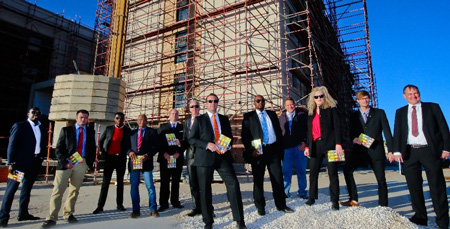
Construction industry body launches another urgent appeal for statutory regulation

Legislation to establish a national construction council stalled in 2010 but the industry was given a glimmer of hope last year at the Economic Growth Summit when the government pledged to finalise the statutory requirements for setting up a council.
This should have been done by the end of March this year but in the meantime, the process has been overtaken by events, stalling again but this time due to the lockdown. Now it is hoped that the establishment of a council will receive renewed attention once the construction industry is fully back in operation.
Renewing their call for a national construction council, the General Manager of the Construction Industries Federation of Namibia (CIF), Bärbel Kirchner this week said it is extremely important that the industry be regulated. Once the structure is in place to register contractors, it will prevent the unregulated and intermittent entry into the industry of unqualified and unskilled people who give themselves out as contractors.
It will also prevent the evil of tenderpreneurs who put up contractor companies as window dressing just to be awarded government contracts, which are then farmed out to subcontractors at vastly inflated prices.
Futhermore, a mandatory council registration will ensure compliance with national building standards, eliminating sub-standard work and the tendency of fly-by-night builders to abscond from projects which they have ruined or where they have run out of money.
“We have had meetings with the authorities who are concerned about workmanship and that projects are being deserted. That is indeed a very bad situation as this surely leads to a waste of tax money as often related buildings or infrastructure can then not be occupied and utilised for its purpose. For this reason, we will continue to lobby the government for the establishment of a national construction council, which would play a most important role of regulating the industry,” stated Kirchner.
The CIF emphasised that a statutory construction council will be able to regulate and control the industry ensuring that it develops to a mature, standards-based industry in future. With a clear mandate it would be in the position to determine what size projects should be awarded to which contractors, based on capacity and capability. Registration and classification of contractors – including foreign contractors – would be based on previous work completed. It would also ensure that well-established contractors would not be able to tender for projects that are more suitable for SMEs. The same would apply to large projects that demand contractors with adequate ability, experience and resources.
The federation said a national construction council would require all businesses that operate in the construction sector to be registered. “At the moment, anyone can operate a business in the building and construction sector without proof of previous experience. The member-based CIF is an organisation where businesses in the sector register on a voluntary basis to have their interests represented.”
The federation is not a statutory body, therefore it does not have the mandate to monitor or police any construction sites. Members of the organisation, which currently stand at around 280 businesses, are committed to regulate themselves and honour to the Code of Conduct.












































